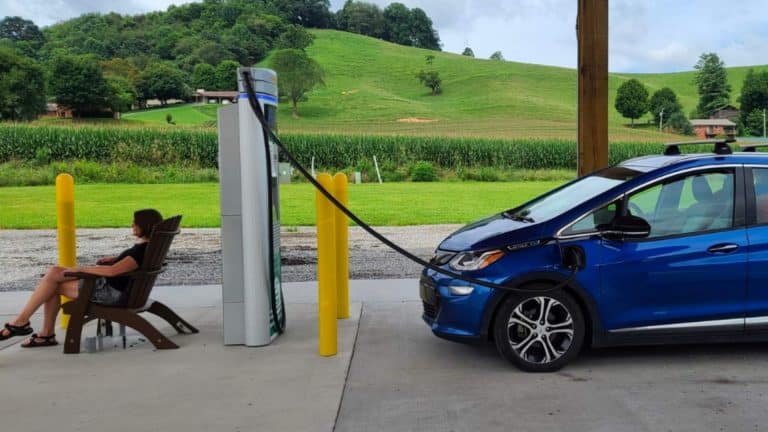The Georgia Public Service Commission (PSC) is making important decisions that impact household electricity bills and Georgia’s air and water quality as it considers Georgia Power’s proposed 2022 Integrated Resource Plan (IRP). While many Georgia residents have already spoken up about their concerns, ideas, and preferences regarding the plan, the PSC’s limit on in-person public input has made it harder for advocates to engage in the process.
We at the Southern Alliance for Clean Energy are working to inform the public about the plan and letting Georgia residents know how they can get involved in this crucial process of planning for Georgia’s energy future.
What is the Public Service Commission?
The Georgia PSC is an elected body that regulates certain electric and gas utilities in Georgia. The PSC decides whether to approve plans and procedures for power plant closures (for example, when Georgia Power decides to retire old coal plants), as well as new power plant construction (for example, when Georgia Power decides to build a new nuclear power facility.)
The PSC also has a say in, how much renewable energy Georgia Power pursues, how solar programs are structured, energy efficiency programs the Company offers, and whether rooftop solar is encouraged.
As part of its regulatory activity, the PSC considers whether Georgia Power’s proposed fees, rates, bill structures, and shutoff policies are fair to consumers, and whether to allow the utility to pass certain costs on to rate-payers. The decisions made at the PSC directly impact how Georgia Power will meet electricity demand from customers in its monopoly service area.
PSC members must reside in one of five districts around the state but are elected on a statewide basis. No matter where you live in Georgia, if a PSC seat is open, you will have the opportunity to vote on a new commissioner. This year, the District 2 and District 3 seats will be on the ballot and voters have an opportunity to vote for new candidates or re-elect sitting commissioners. Both seats are currently held by Republicans, and there are Democratic challengers for each seat. The candidates will appear on ballots for the May 24 primary election and then again for the general election on November 8.
What is an Integrated Resource Plan?
Every three years, Georgia Power submits an IRP detailing projected electricity demand and what sources or fuels they will use to meet the demand for the next 20 years. The PSC holds a series of hearings during which Georgia Power has an opportunity to make its case for its proposals, and stakeholder groups can ask for changes and adjustments to the plan. Industry, consumer, and environmental groups (including the Southern Alliance for Clean Energy) typically intervene in the hearings as formal stakeholders. This year, for the first time, a group of local governments will be at the table as well. The PSC will rule on the IRP on July 21st.
The 2022 IRP proceedings are underway, and Georgia Power will soon submit proposed rate changes to the PSC. This process, known as the Rate Case, is of particular importance to consumers, as the PSC will rule on fees and rates for all Georgia Power customers. Georgia Power is expected to file its new Rate Case proposal on June 24.
Public Input on Georgia’s Power Plans
In past IRP proceedings, members of the public were able to attend meetings and give comments in person before the PSC. During COVID-19, the PSC shut its doors and allowed only written public comments. They have kept these restrictions in place during the 2022 proceedings, allowing just one opportunity so far this year for in-person public input.
Dozens of people took advantage of the opportunity to speak at a public town hall meeting on March 24, 2022, presented by the PSC. Speakers discussed energy affordability and the burden high energy bills places on low-income residents, the need for more solar power and policies that will help Georgia’s growing solar industry, and urged the PSC to provide more opportunities for public input.
For the remainder of the IRP hearings, public comment will be restricted to online, email, and mail communication.

ENERGY AFFORDABILITY
Georgia Power’s service areas include high poverty communities in Atlanta, Athens, and Savannah, where customers in some neighborhoods pay a large percentage of their income to utilities and where poor housing stock and low incomes put families at risk for housing insecurity among other challenges. High utility bills are one more burden in a host of challenges these communities face. Atlanta resident and SACE Energy Policy Manager, Heather Pohnan, noted at the March 24 PSC town hall that long-lasting benefits of energy efficiency can prevent utility investment in new electricity generation.
Read what other Georgians said to the PSC at the town hall on energy affordability:
Atlanta resident, Gloria Woods, representing High Stepper Senior Group at Pittman Park, urged the PSC to require Georgia Power to expand energy efficiency and weatherization for seniors:
“It is your job to ensure we have reasonably priced electricity.”
Wan Smith, of Georgia Conservation Voters, highlighted that Georgians deserve to have their basic needs met:
“Affordable energy should be a human right.”
Deborah Opie, Senior Organizer for Georgia Conservation Voters, echoed other speakers as she asked for fee relief to those on fixed incomes:
“I’m here to represent people who couldn’t be here today… [People facing high energy bills] reduce the number of times per week they cook to lower their energy bills. In the winter they’re cold, in the summer they’re hot… People choose between paying for energy or paying for medicine.”

RENEWABLE ENERGY
PSC regulations could have a major impact on reducing Georgia’s overall pollution from energy production and bring the state closer to aligning with the President’s target to reduce greenhouse gas emissions to 50% of 2005 levels by the end of this decade. Georgia’s solar energy industry has grown dramatically in recent years, thanks in part to utilities’ contracts for utility-scale solar. The state has a similar opportunity to expand rooftop solar: a pilot program that allowed 5,000 rooftop solar customers to be fairly credited by Georgia Power for the excess electricity they send back to the grid filled quickly and reached the cap, drawing concerns from advocates that the rooftop solar market will lose steam when customers are no longer able to access a fair rate for the energy they produce. Bert Pearce noted that Georgia Power plans to install 11 GW of solar by 2035, but urged the PSC to ramp up the schedule to meet the goal by 2028.
Read what other Georgians said to the PSC at the town hall on solar and renewable energy:
Don Moreland, executive director of the Georgia Solar Energy Association, referenced Georgia Power’s 2019 monthly netting pilot program, which reached its cap of 5,000 households by July 2021. The program allowed the 5,000 solar customers to receive Georgia Power’s retail rate for energy they send back to the grid. He urged the PSC to ensure there’s enough room in any future programs to keep the solar industry growing until the 2025 IRP:
“This boom and bust cycle is not the best way to grow an industry.”
Advocates also called on the PSC to do more to maximize the opportunities that the green energy transition can bring to Georgia. Lisa Coronado, from Decatur, pointed out that energy transition is an “enormous opportunity” for economic benefits and Neil Sardana, from the Sierra Club, urged expanding clean, affordable, renewable energy to counter Russian aggression.
Canton resident, Michael Keriaku added to the shared sentiment to invest in clean energy by saying:
“Georgia leads the country in growth of clean energy jobs,” and urged the PSC to “think deeply about green jobs.”
Another Opportunity for Public Participation
Several speakers advocated for the PSC to allow more public participation in the IRP process, including Chandra Farley, resident of Atlanta and current candidate for Public Service Commission District 2, who said “It’s time for a fundamental shift in how energy decisions are made” and asked the PSC to “authentically include lived experience as expertise” so Georgians can “create an equity-centered process together.”
[button color=“green” url=”https://secure.everyaction.com/NUcV9FPE4kyAn72kI1iKqg2”]Register for the Town Hall[/button]
Since the March 24 town hall meeting in Atlanta, several environmental advocacy groups have decided to come together to host a town hall-style event in Athens, Georgia on May 19 to provide an opportunity for those who couldn’t get to the Atlanta meeting a chance to weigh in on Georgia Power’s plans. The event will give Georgia residents in the Athens area the opportunity to learn more about Georgia Power’s proposal and the Public Service Commission’s role in the process. Following brief presentations, attendees will have the opportunity to submit comments about the IRP to be delivered to Public Service Commissioners. If you’re in Athens or the surrounding area, join us on May 19th, at 5 PM, at Creature Comforts Brewery.












